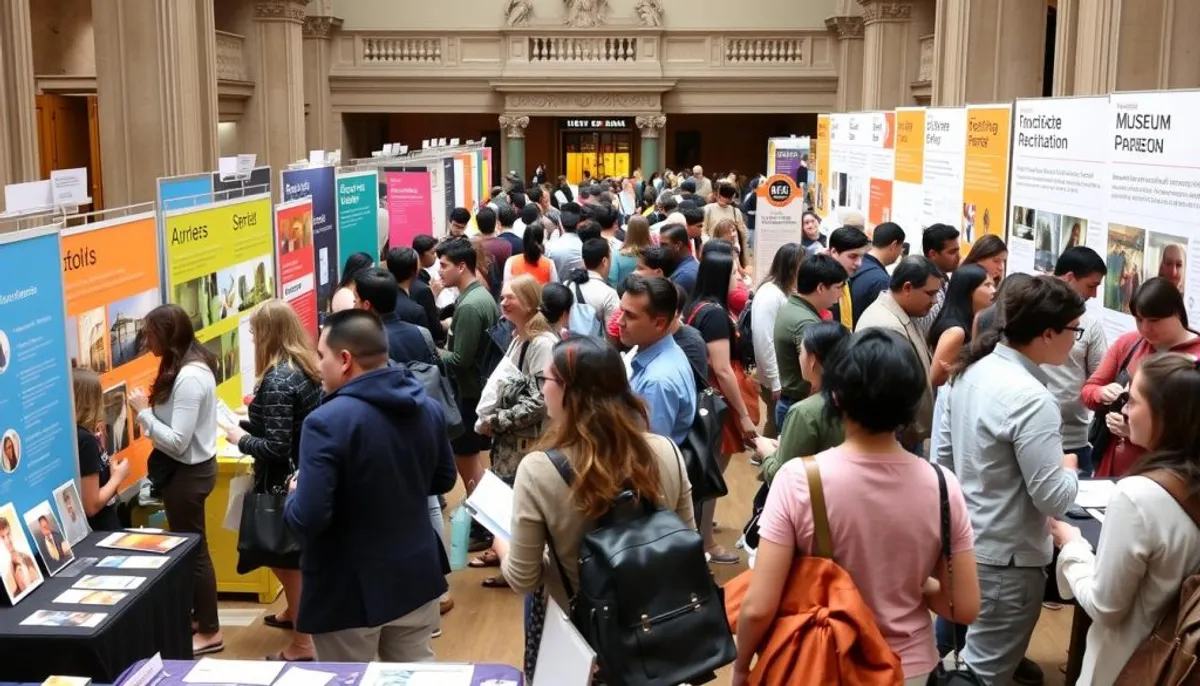The cultural sector in France is distinguished by its diversity and importance. It accounts for nearly 740,000 jobs, representing 2.7% of total employment. This field, which contributes about 2% of the national GDP, offers a range of varied opportunities. Holders of a master's in culture can consider careers in administration, project management, or partnership development.
Job opportunities extend beyond the public sector, encompassing private structures. Positions are available in museums, theaters, festivals, as well as in publishing, audiovisual, and new technologies. A master's in culture paves the way for exciting careers in art, communication, and heritage.

Graduates hold positions such as production assistant, administrator, or broadcasting officer. They join prestigious institutions like the Centre Pompidou or the Louvre Museum. The live performance sector and local authorities are also recruiters. With over 1,200 labeled museums in France, job prospects in culture remain promising.
What to do with a master's in culture: Overview of the sector
The cultural sector in France presents itself as a goldmine for holders of a master's in culture. It is characterized by a diversity of disciplines and requires specific skills to thrive.
Areas of application in the cultural sector
The cultural sector covers a spectrum of disciplines, ranging from cultural engineering to specialized journalism. It also includes cultural management, event planning, publishing, bookstores, public reading, and cultural animation. These areas offer stimulating prospects for graduates.
The importance of the cultural sector in France
The cultural sector is essential to the French economy. It attracts a wide range of students, particularly those in Cultural Studies, Literature, and Humanities. Graduates find opportunities in prestigious institutions and innovative companies.
The skills required to succeed
To excel in the cultural sector, it is crucial to possess certain skills. Students must develop their ability to evaluate and produce critical tools. They must also assess cultural productions, design and implement cultural actions, and communicate in at least one foreign language.
| Institution | Number of reviews |
|---|---|
| Sup de Pub Paris, INSEEC Group | 39 |
| FASSE Catholic Institute of Paris | 7 |
| UFR LSH - University of Cergy-Pontoise | 5 |
| UFR Arts, Letters, Communication, University of Rennes | 8 |
| UFR of Humanities and Social Sciences, University Paris 13 | 7 |
The various professions accessible after a master's in culture
Obtaining a master's in culture opens the door to a multitude of exciting careers. Graduates can explore various fields, from project management to communication, as well as heritage conservation. These options offer a wealth of professional perspectives.
Here is an overview of jobs in the cultural sector accessible after this degree:
- Officer of cultural communication
- Cultural mediator
- Cultural project manager
- Administrator of cultural institutions
- Heritage curator
- Exhibition curator

Salaries vary depending on the position and experience. For example, a communication officer can expect a gross annual salary of around €28,000. In contrast, a public relations manager can reach €40,000. These figures illustrate the variability of salaries in the cultural sector.
| Job | Gross annual salary |
|---|---|
| Communication officer | €28,000 |
| Cultural mediator | €24,000 |
| Cultural project manager | €25,000 |
| Public relations manager | €40,000 |
To excel in these cultural careers, it is essential to gain multiple internships and professional experiences. This helps to build a strong network and acquire valuable experience. These two elements are crucial for starting in the cultural sector, where the conflict of cultural belonging can also play a significant role.
Organizations that hire culture graduates
The cultural sector, rich with 650,000 jobs in France, attracts those who are passionate about culture. It includes a wide range of employers, from public institutions to private companies. The latter offer varied opportunities for graduates.
Public institutions and local authorities
Local authorities are major recruiters of cultural mediators. A beginner can expect a gross monthly salary of around €1,800. Public libraries offer a starting salary of €1,900 gross for a librarian.
Museums and historical monuments
France is home to over 1,200 museums labeled by the Ministry of Culture. These institutions offer various positions, such as guide, mediator, or curator. The cultural recruitment in this sector is dynamic, offering opportunities in prestigious places such as the Centre Pompidou or the Louvre Museum.

Live performance sector and festivals
Theaters, artistic companies, and festivals are significant employers. A show manager can earn between €1,800 and €2,200 gross per month. The Dour Festival or the European Festivals Association are examples of cultural institutions seeking talent.
Communication and media structures
The media and communication sector offers interesting opportunities. A junior communication officer can earn around €2,000 gross monthly. Companies like Hachette Livre or platforms like Paperblog regularly recruit culture graduates.
The cultural recruitment is diverse, with positions ranging from sociocultural animation to cultural project management. Salaries often start close to the minimum wage but evolve with experience. To succeed, a minimum of a bac+3 level is recommended, with a preference for master's degrees in fields such as cultural management or cultural policy.
Career advancement prospects in the cultural sector
The cultural sector presents a boon for professional advancement. Holders of a master's in culture can expect a rich and diverse career. The training programs, with a satisfaction rate of 96% among interns and a certification achievement rate of 92%, effectively prepare professionals for the challenges of the sector.
Advancement opportunities are vast. Professionals often aim for positions of responsibility, such as director of cultural institutions or head of cultural policies. Management of international cultural projects is also available for those aspiring to work internationally.
Advancement opportunities exist in both the public and private sectors. Museums, local authorities, festivals, and communication structures are promising areas. Specialization in certain cultural fields can also favor professional progression.
To optimize chances of advancement, it is essential to stay informed about sector trends. Developing a professional network and continuing education are crucial to remain competitive in a constantly evolving field.
Conclusion
The cultural sector presents a multitude of opportunities for holders of a master's in culture. Although challenges exist, the future of this field appears promising. It offers prospects in various areas, such as public institutions, museums, live performances, and media.
Cultural professionals are crucial for the preservation of heritage and national economic development. To excel, it is imperative to possess versatile skills and adapt to changes in the sector. Creativity, project management capabilities, and mastery of digital tools are invaluable assets.
Ultimately, embracing a career in culture requires a genuine passion and deep commitment. Graduates must be ready to face the challenges of a constantly evolving sector. With perseverance and flexibility, they can positively influence the future of the cultural sector in France and beyond.
RelatedRelated articles


